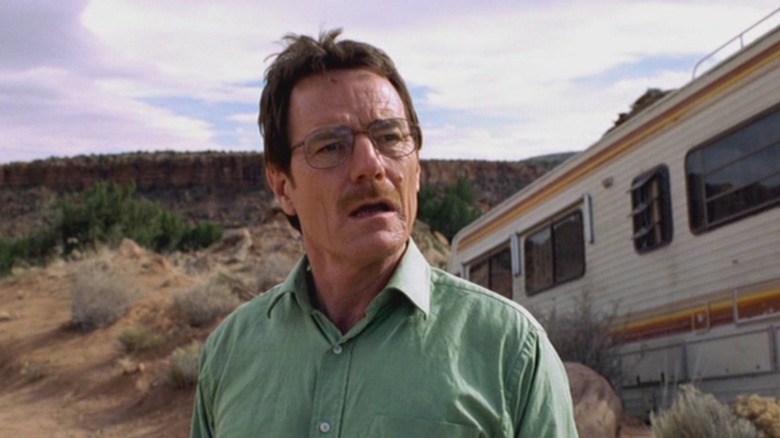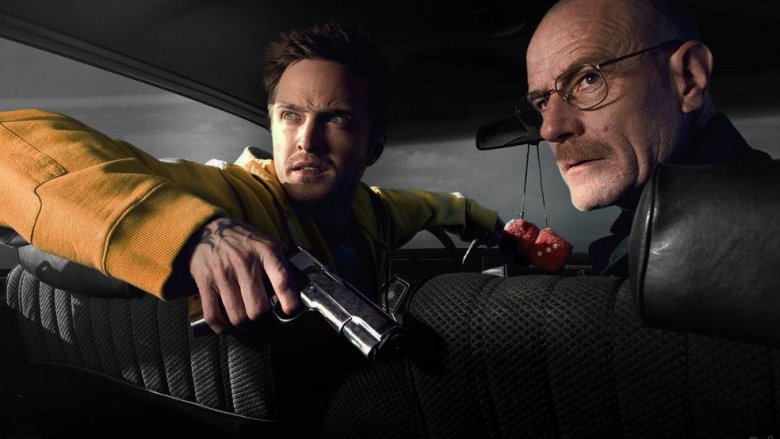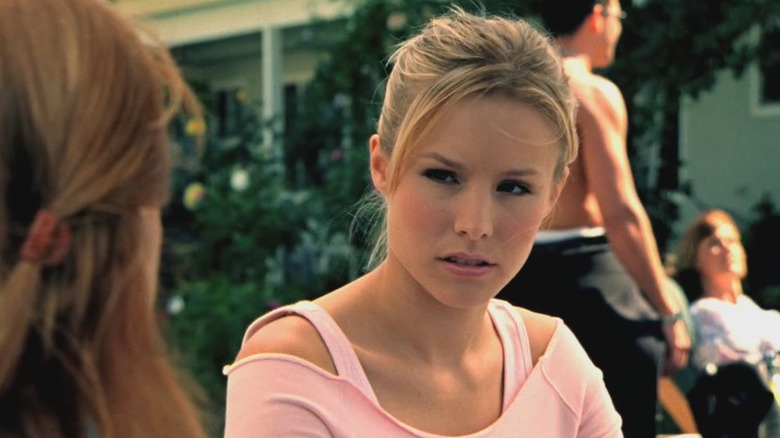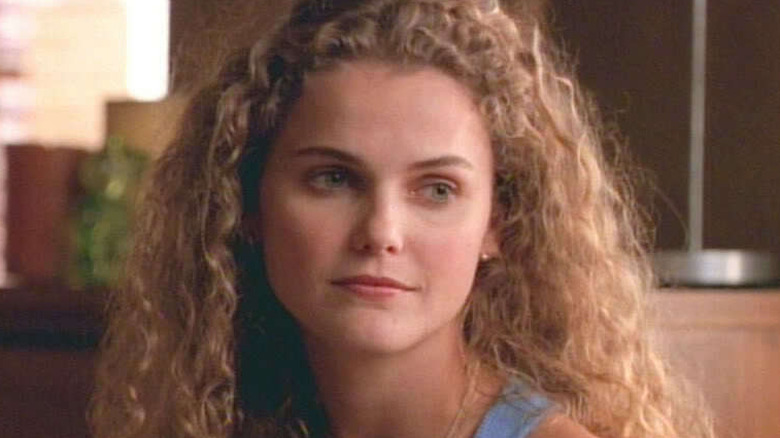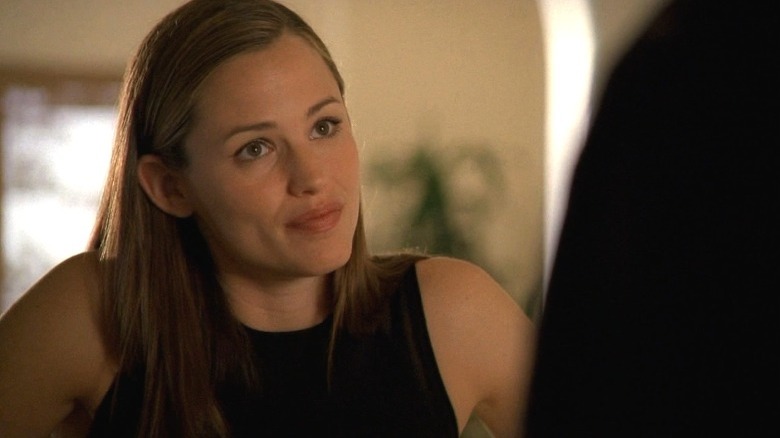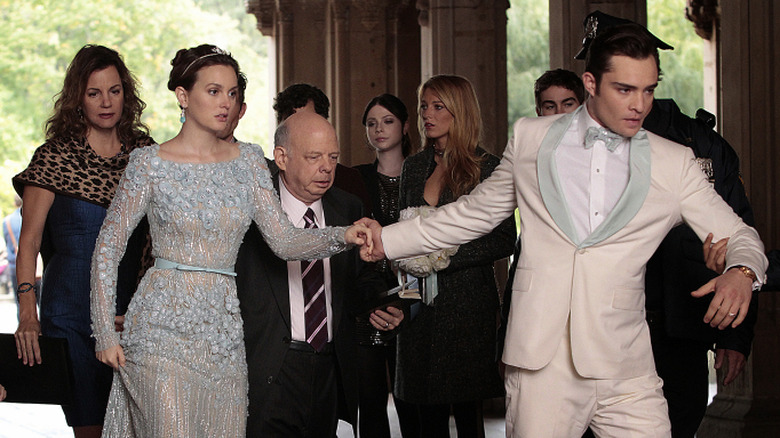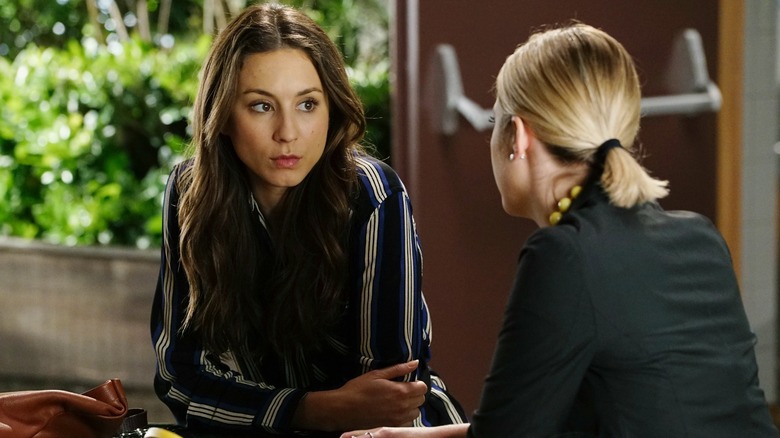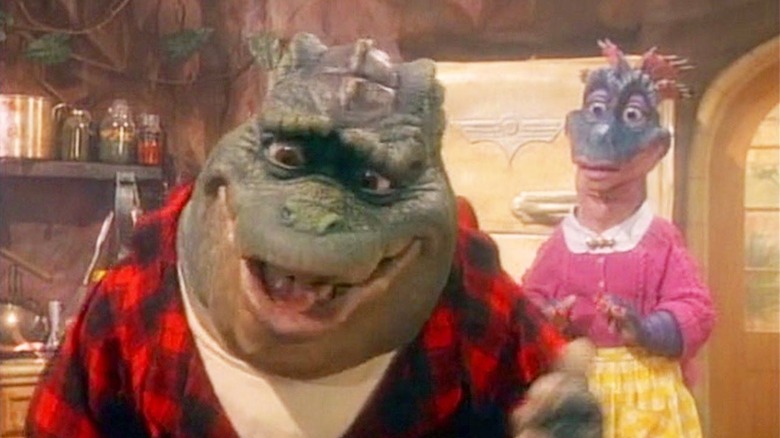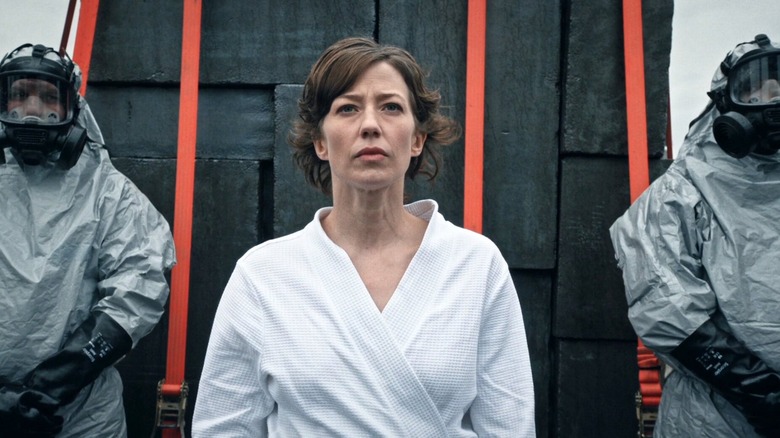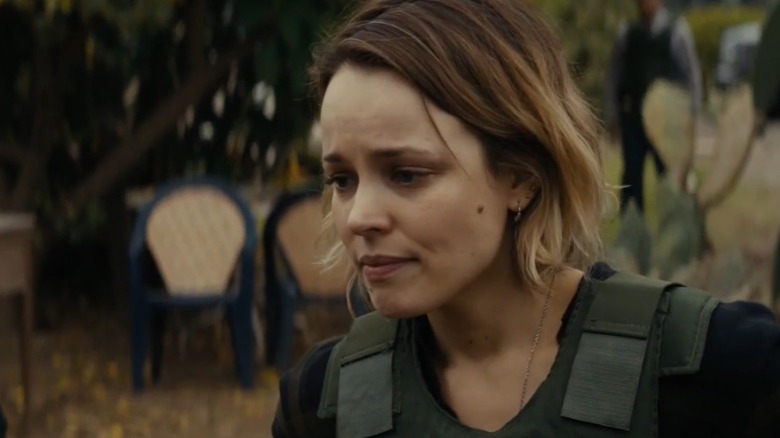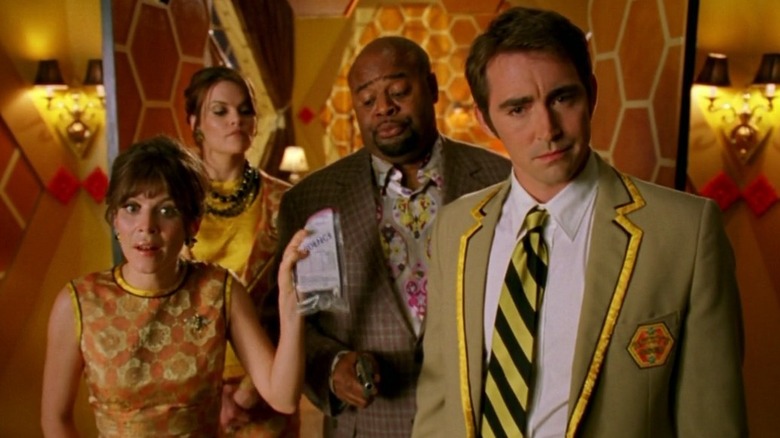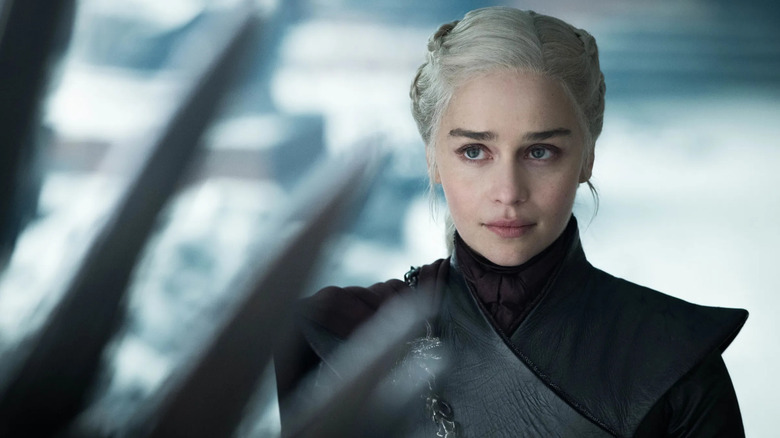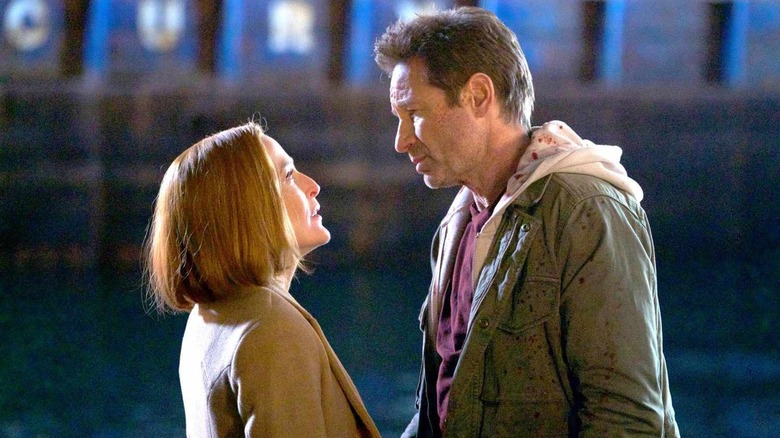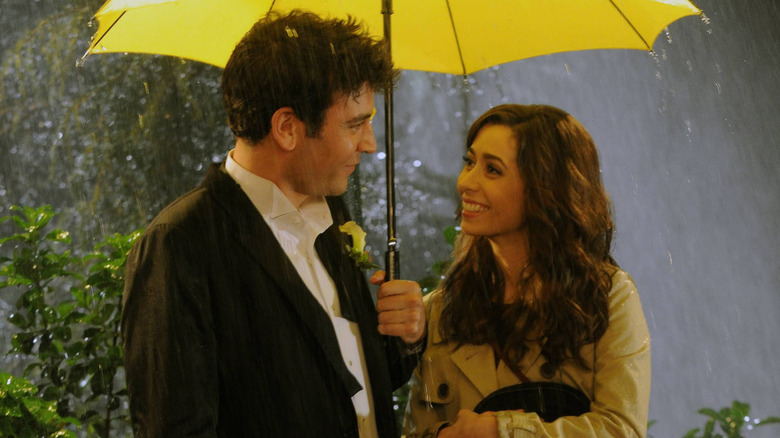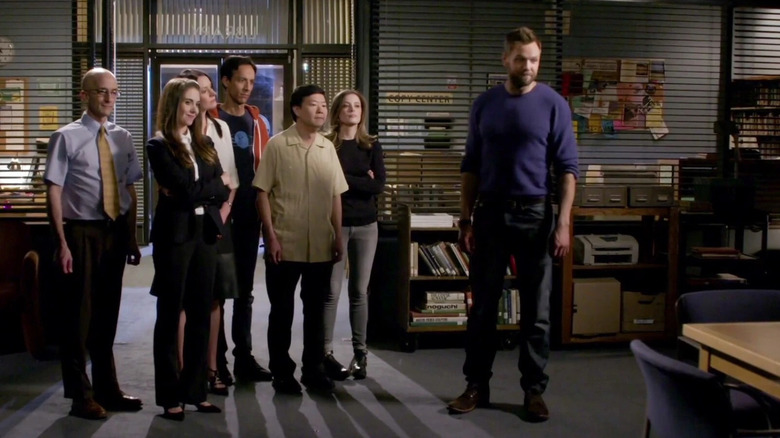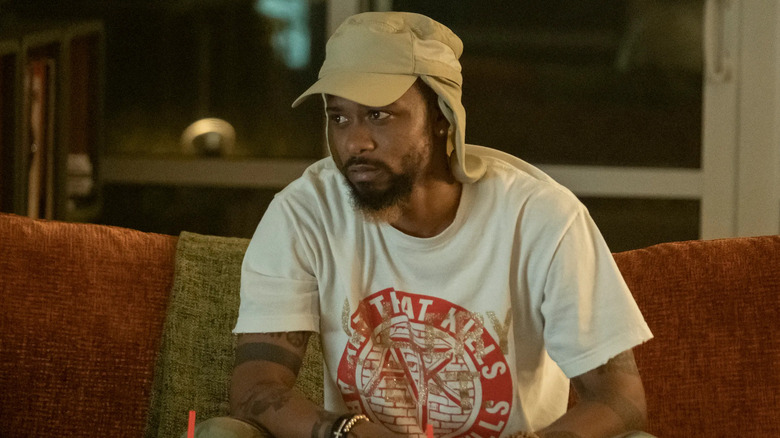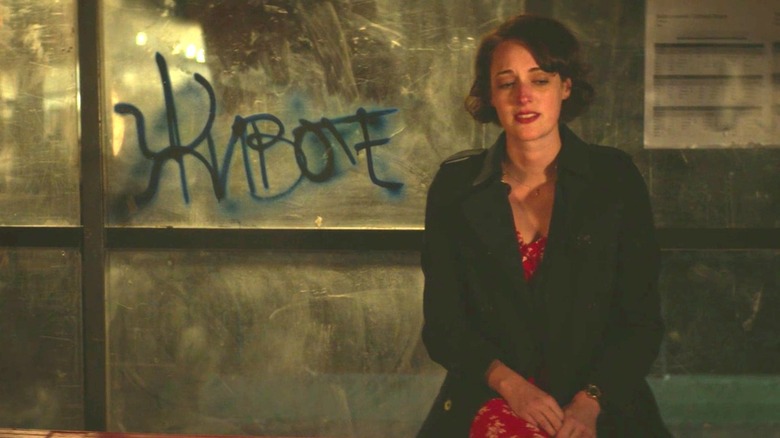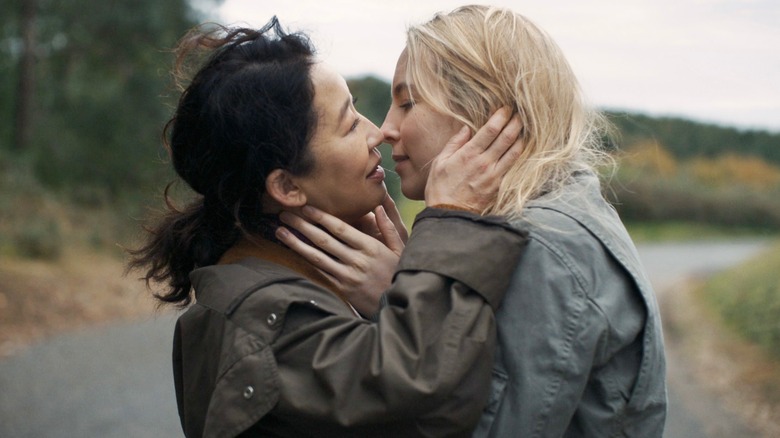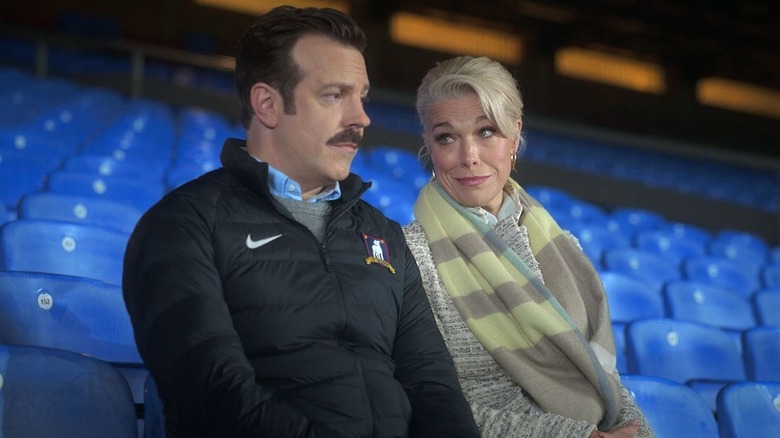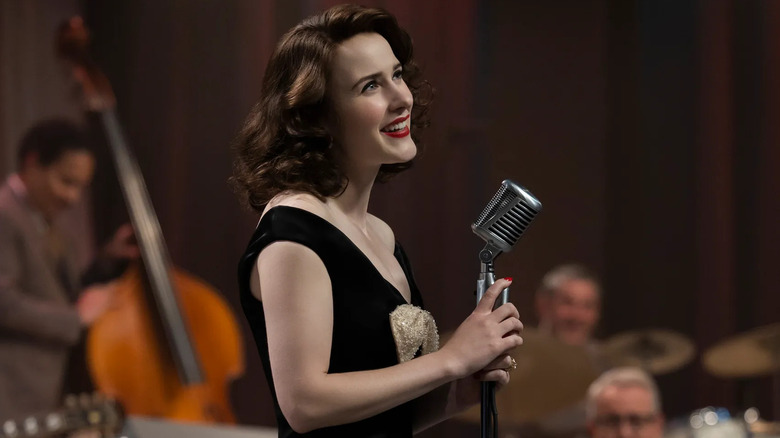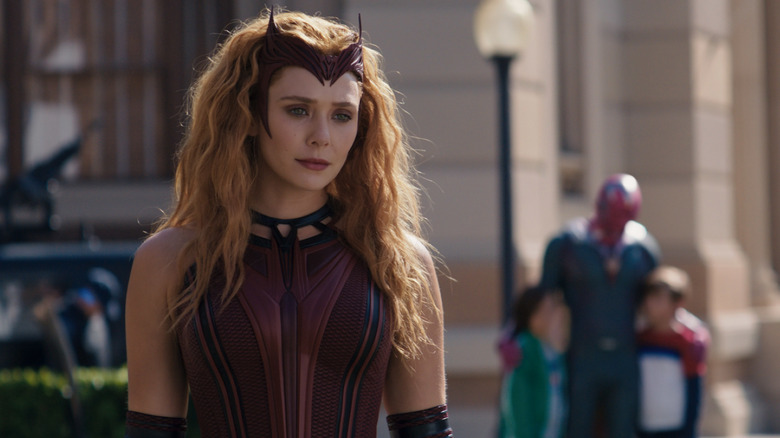Confusing TV Show Endings Explained
Starting a new show is kind of like getting involved in a new relationship. You develop an infatuation, devote your time to it, and get completely invested. In the end, you'll either be happy and fulfilled, or you'll end up bitter and disappointed. Whether you get the ending you want or not, you're often bound to come away with lingering questions, or even end up completely baffled about what just happened.
So many television shows have stuck their landings ("Six Feet Under," "The Americans," and "Parks & Recreation" come to mind), and plenty have not — famously, shows like "The Sopranos" and "Dexter" deeply disappointed longtime fans who faithfully stayed with them until the very end. A series finale can't possibly satisfy every single fan, but some are just plain confusing, and whether the finales seemed entirely slapdash or were just difficult to understand, many viewers have been left at a loss when their favorite shows ended. Here, we try to explain some of the on- and offscreen reasons that hit shows ended the way they did.
Breaking Bad
AMC's hit drama "Breaking Bad" launched Bryan Cranston's career as a dramatic lead, kept audiences riveted through five seasons of twists and turns, and even spawned a particularly worthy spinoff (the Bob Odenkirk vehicle "Better Call Saul," which has been lauded by critics), and when the series finale, "Felina," aired in September of 2013, it was watched by over 10 million viewers. Audiences might have been ready to see unlikely drug kingpin Walter White meet a sticky end, but instead, he freed Jesse from captivity, said goodbye to his wife and children, and died on his own terms before police could apprehend him, ultimately getting the happiest ending anyone could expect from such a dark, often horrifying story.
Though the episode was critically adored, many viewers were left befuddled by the ending, which wrapped up perhaps a little too neatly, and before too long, the internet was ablaze with numerous theories about the story's conclusion, with the most prominent being that Walter died not at the end of the episode, but just before the halfway mark. While trapped in a broken-down, snow-covered car trying to elude the police, Walter was able to miraculously escape, and many have argued that his rescue of Jesse and time with his family is his dying fantasy, which might clear up this implausibly happy ending for some irritated fans.
Veronica Mars
In the midst of the early aughts, when primetime teen soap operas reigned supreme, teens and adults alike who were looking for a darker, more sophisticated show turned to "Veronica Mars," which began airing on UPN and made the jump to the CW, the product of UPN and the WB merging before its 3rd season. Starring Kristen Bell as the titular teen sleuth, the show chronicled Veronica's myriad of mysteries and cases in her hometown of Neptune, California.
However, the series came to an abrupt end during its 3rd season, when the CW abruptly announced the show's cancellation just before the season finale aired, despite creator Rob Thomas' pitch for a story in which Veronica would go on to work for the FBI. During her college graduation, Veronica figures out that evil billionaire Jake Kane has an intimate tape of her that he has used to publicly shame her, and after cutting her ex Logan out of her life for attacking her current boyfriend, Piz, Veronica is at a loss as to what to do next. Audiences were left with plenty of unanswered questions, including the fate of her father's race for sheriff. Years later, fans rallied and raised over $5 million for a movie follow-up that arrived 2014. It was followed by a new season on Hulu in 2019, meaning fans have finally gotten closure in the years since.
Felicity
"Felicity," which served as a launch pad for stars like Keri Russell and Scott Foley as well as creator J.J. Abrams, was a college drama about incoming freshman Felicity (Russell) following her crush Ben (Scott Speedman) across the country to New York rather than attending school in California as planned. Along the way, she finds herself involved in a love triangle between Ben and Noel (Scott Foley), but as the show progressed and Abrams moved on to other projects, many viewers and critics believed it suffered.
The confusion behind the series finale is as follows: The show ends with Felicity's college graduation and her choosing Ben, but after that, the WB asked for five more episodes, which led the writers down a twisting, time-travel based path that asked what might happen in an alternate universe where she chose Noel rather than Ben, the boy she followed to the East Coast in the first place. Because the show technically had already ended, this Noel-based universe was utterly confusing to most fans, who thought the show had already completed its story. This time traveling befuddled not only fans of the show, but some members of the cast, with Scott Foley admitting later that he barely had any idea how the show ended. However, one promising development came out of this, as Abrams, frustrated in the writer's room, started to wonder what might happen if Felicity became a spy — which led directly to his next project.
Alias
Devoted "Alias" fans will always remember Jennifer Garner as Sydney Bristow, an butt-kicking super spy who worked as a double agent within the CIA to take down SD-6, a mysterious terrorist cell. With a supporting cast that included Victor Garber as Jack Bristow (Sydney's tough yet loving father), Michael Vartan as Michael Vaughn (Sydney's handler, partner, and eventual love interest), and even a young Bradley Cooper as Will Tippin (Sydney's best friend), the show balanced classic spy drama with an ancient, mysterious figure named Milo Rambaldi, who seemed to be the key to the show's entire story.
However, thanks to Jennifer Garner's real-life pregnancy and the show's decision to kill off Vartan's character at the height of their romance, ratings slipped, and ABC decided to cancel the show in 2005. The series finale, as a result, was a confusing, noisy, mess, bringing Vaughn back (saying that he had faked his death), putting all its eggs in the Rambaldi basket, killing most of the supporting cast (including both of Sydney's parents), a bizarre scene involving a man being buried alive and his daughter's ghost, and ending with an epilogue that found Sydney and Vaughn on a beach watching their children play, with a strong suggestion that their daughter could become a spy later in life. Years later, Cooper would reunite with some of his co-stars for his directorial debut "A Star Is Born," giving Alias fans a little gift after a disappointing ending.
Gossip Girl
Fans of whip-smart teen soaps with phenomenal soundtracks like "The O.C." flocked to "Gossip Girl" when it premiered in 2007, hoping to one day discover the identity of mysterious blogger Gossip Girl (voiced by Kristen Bell), who keeps track of Manhattan's richest and most popular teenagers. With over-the-top yet relatable characters like queen bee Blair Waldorf (Leighton Meester), troubled beauty Serena van der Woodsen (Blake Lively), and Brooklyn outsider and aspiring writer Dan Humphrey (Penn Badgley), fans spent six seasons obsessing over their fantastically unrealistic exploits (it still seems pretty unlikely that Chuck Bass would own a hotel before he could legally drink).
As the 6th season came to a close, the series mostly did an excellent job wrapping up everyone's storylines, but the big reveal — that Gossip Girl had been Dan the whole time — still, to this day, makes basically no sense (even Badgley admitted as much). Not only did Gossip Girl constantly attack Dan, his younger sister, and his future wife Serena, he also was frequently surprised by what turned out to be his own revelations, and it was often impossible for him to have the information he was transmitting. It looks like fans weren't wrong to be confused, as Schwartz later said Gossip Girl was supposed to be Serena's younger brother Eric, but people guessed it too quickly. By pairing off Serena and her bully as well as shoehorning previous guest stars like Lisa Loeb and Billy Baldwin into the episode, the show left audiences baffled.
Pretty Little Liars
Following in the footsteps of "Gossip Girl," the whirlwind drama "Pretty Little Liars" focused on beautiful yet wild teenagers trying to figure out the identity of "A," a mysterious figure who is constantly threatening to expose their myriad secrets. With four female leads — Aria Montgomery (Lucy Hale), Spencer Hastings (Troian Bellisario), Hanna Marin (Ashley Benson), and Emily Fields (Shay Mitchell) — the show followed these friends as they navigated their lives in the small suburban town of Rosewood amidst murder threats, bodily harm, and other deeply dramatic dangers.
Showrunner I. Marlene King, who steered "Liars" for the entirety of its run, brought together a "bonkers" ending, where it was revealed that A was actually Spencer's twin sister (that Spencer never even knew existed), a grand finish that had been in the works for a number of years. Beyond that, it featured Aria marrying her high school teacher, and saddled every character with a newborn baby. Even King seemed confused about some of the finale's plot threads, and when answering questions about it, she seems to not have very many answers about fans' lingering questions.
However, even in the context of a show that was notoriously confusing and often nonsensical throughout its seven-year run, fans were extraordinarily vocal about their disappointment in the finale, taking to the internet to express their feelings and even go after King. For a show that trafficked in confusion, the ending should have suited it perfectly, and it's still unfortunate that fans felt differently.
Dinosaurs
A completely unique network television series, "Dinosaurs" came from an original concept by Jim Henson, the father of the Muppets and founder of the always ambitious Jim Henson Company (though Henson tragically died in 1990, one year before the show premiered). Set in 60,000,003 B.C., the show focused on the Sinclair family of dinosaurs, which included father and mother Earl and Fran; children Robbie, Charlene, and Baby; and Fran's mother, Ethyl. The family faced topical and often edgy issues, marking the show as progressive and intelligent despite its heightened reality and puppet stars.
However, the finale is famously dark in tone compared to the rest of the show — the community's poor environmental decisions lead to their demise as the Ice Age becomes immediately imminent. Fans were quite surprised when a show that had an inherently sweet tone by and large ended with the Sinclairs sitting on their couch, awaiting death. However, the message was clear — willful ignorance and greed led to the dinosaurs' demise. Knowing the show would be canceled in its 4th season, creators planned for this shocking finale, and its message remains relevant today. Even a straightforward finale can cause confusion among viewers, but at least with "Dinosaurs," it's clear what the showrunners wanted to say.
The Leftovers
Considering that the entire premise of "The Leftovers" is based around the aftermath of a mysterious (and eventually, maybe, unexplained) Rapture-like event where 2 percent of all people vanished from the face of the Earth, the finale was bound to be fairly confusing — although in this instance, that wasn't viewed negatively, as critics and viewers alike almost unilaterally praised the show's final episode.
The series finale, "The Book of Nora," is a perfect showcase for Carrie Coon, who spent three seasons as Nora Dunn. As she tries to reunite with her loved ones, who initially disappeared in what is referred to as "The Departure," she finds herself on an entirely new journey, albeit one that reunites her with Kevin (Justin Theroux), her on-again, off-again lover. Viewers are left wondering if Nora is telling Kevin the truth about what happened to those who were "taken" from Earth, and the finale never provides a definitive answer, leaving many loose threads unraveled, but for a show that dealt so heavily in mystery, it felt appropriate for it to end on an utterly ambiguous note.
Throughout the series, "The Leftovers" took a huge number of risks, and though the finale offered closure about whether those who departed were living happy lives, it still remained confusing to plenty of viewers. What does Nora really know? How did Kevin find her again? Where do they go from there? With all these questions still in the air, it's easy to feel lost after this finale.
True Detective Season 2
After the massively successful 1st season of HBO's anthology series "True Detective," which garnered critical acclaim for creator Cary Joji Fukunaga and stars Matthew McConaughey and Woody Harrelson, audiences were incredibly excited for the 2nd season, which featured Vince Vaughn, Rachel McAdams, and Colin Farrell in leading roles. That excitement was perhaps premature — it finished with disappointing reviews, thanks to lackluster performances, a simultaneously baffling and boring throughline, and a central murder case that turned out to be fairly irrelevant. Though the season initially set up a fascinatingly gruesome murder as the show's central plot, the finale solved it quickly and underwhelmingly, as most of the characters are killed off, leaving Rachel McAdams to inexplicably run away to Venezuela. The closest thing audiences got to closure was the construction of a rail project, which doesn't exactly seem riveting enough to serve as the climax for such a twisting, brooding show.
The season finale fared worst of all critically, squandering any goodwill that small parts of the show had built up — thanks to too much exposition, one too many shootouts, and characters betraying their previous motivations, critics were less than enamored with the show's grand finish.
Pushing Daisies
Plenty of beloved series are canceled too soon, and "Pushing Daisies," an early effort from "Hannibal" creator Bryan Fuller, is one of the most frequently cited examples. A visual feast set in a fantasy world that was still somehow grounded in pieces of reality, the show was narrated by Jim Dale (famous for his work on Harry Potter audio books) and starred Lee Pace as Ned, a shy pie-maker with a special, non-pie related talent — he could bring anything back from the dead just by touching it, but if he ever touched that now-living creature again, it would die forever. Using his power, he brings his childhood love, Charlie (Anna Friel) back to life, and though they can never touch, the pair spend the series solving various murder cases.
Unfortunately, the show was cancelled after a dip in ratings during its 2nd season, which prevented it from having an official and satisfying finale. Though many fans were happy with the ending, the show concluded on a cliffhanger — Chuck reveals herself to her family and tells them she's still alive. Thanks to an abrupt cancellation that surprised the creators, several threads were left hanging, including a storyline about Chuck's absent father, and since it wasn't intended to be the finale, the episode focuses more on Chuck's eccentric aunts than the two main characters.
Fuller offered fans hope in the form of a limited-release comic book that would detail what happened after the finale ended. Unfortunately, the closing of the comic's publisher, DC imprint Wildstorm, meant that nothing but sample pages ever made it to completion. Fuller still remains hopeful that the story will come back from the dead in some form.
Game of Thrones
The ending of "Game of Thrones" we wanted was sadly not the one we got, nor the one George R. R. Martin has even written. The show has already seen criticism for the shortened length of its final two seasons, but it wasn't rushing to the end that saw "Game of Thrones" lose its goodwill with audiences; it was the events of the finale, "The Iron Throne," that puzzled viewers the most.
After destroying King's Landing, Daenerys Targaryen finally claims the Iron Throne, only to be pitifully assassinated by her own lover, Jon Snow. For this, Jon is punished by the remaining lords and ladies of Westeros with the ironic fate of ending up back at the Wall, right where he started. Meanwhile, Tyrion nominates Bran Stark to be the new king of Westeros, with a Small Council including Davos, Samwell, Brienne, and Bronn, while Sansa secedes with the North and Arya goes off to explore.
Many fans felt Daenerys' heel turn was unearned, with Vanity Fair writing, "We've had very little access inside the troubled mind of Daenerys Targaryen perhaps by accident, or perhaps with the intention to shock. That led to a fiery plot twist that left many non-book-reading fans disturbed, and ... very angry." The most confusing detail, however, is Samwell presenting a written history of the show's events (titled "A Song of Ice and Fire" — cue eye-rolls) while admitting that Tyrion isn't mentioned in it. Seriously, Tyrion is the man who was convicted of murdering King Joffrey and served as the Hand of the King or Queen to three separate monarchs, one of whom being the woman who just destroyed the largest city in Westeros — how is he not even mentioned?
The X-Files
"The X-Files" has never been the least confusing show on television, but the (supposed) series finale took things to a new level. Most of the 11th and final season revolves around Mulder and Scully searching for their long-lost son, William, who is on the run from government agents, by relying on Scully's psychic link with him. Believe it or not, this is the most straightforward part.
The final episode, titled "My Struggle IV," concludes with a confrontation between the Cigarette Smoking Man and Mulder, ending in Duchovny's character being shot. However, the real Mulder appears and kills the Cigarette Smoking Man, revealing that it was actually William disguised as Mulder who had just been killed. Afterwards, Scully reveals to Mulder that William wasn't really their son, but an experiment implanted into her by the Cigarette Smoking Man. She reveals to Mulder that she really is pregnant with his child now, while William is revealed to have survived his seemingly fatal injury.
Perhaps there would've been an opportunity for "The X-Files" to make this cliffhanger ending less of a mess if they had a chance to continue the story. However, Gillian Anderson has confirmed she's done with the series barring a major creative overhaul, but even creator Chris Carter seemed unsatisfied with "My Struggle IV" being the ending, telling Entertainment Weekly, "If this was the last episode, would I be happy? I don't know. There are so many questions that this begs now." At least he's not the only one thinking that.
How I Met Your Mother
For a show that ran for nine seasons, "How I Met Your Mother" had a near impossible mission of introducing the mother of Ted Mosby's children. Against all odds, the showrunners completely nailed it by casting Cristin Milioti as Tracy McConnell, who fans immediately recognized as a match made in heaven for the hopeless romantic. However, things were still ill-fated for the character, as the hints piled up that, in the future where older Ted (voiced by Bob Saget) narrates the titular story, Tracy has passed away.
The two-part finale, "Last Forever," received backlash, mainly due to the twist revealing that despite getting married and raising two children, the Mother succumbs to an unknown illness. After finishing his story, Ted's two kids, Luke and Penny, give their blessing for Ted to pursue "Aunt Robin," who has lived alone since her sudden divorce from Barney. Many fans felt betrayed by this last-minute forced get-together, despite it being planned out early in the show's run. Still, the sitcom had seemingly moved on from Ted's pining for Robin, so they could've pivoted directions.
On the final season's DVD release, the alternate ending to "How I Met Your Mother" became the real one for many fans, ignoring the Mother's passing and Ted's regression that comes with pursuing a relationship with Robin yet again. However, there's moments earlier on the show that foreshadow her tragic fate, so maybe it's just Ted pursuing Robin that needed to be cut.
Community
"Community" Season 6 wasn't the first time that the show had "ended," technically. "Community" got cancelled after its 5th season, following years of tumultuous production and near-cancellations, before being revived for one more round on Yahoo! Screen in 2015. This time, the show's conclusion, sans #AndAMovie, seemed more final, given that the show had lost main cast members Donald Glover, Chevy Chase, and Yvette Nicole-Brown by the end.
In proper "Community" fashion, "Emotional Consequences of Broadcast Television" features the main characters pitching their own ideas for what another year (or as Abed calls it, "season") at Greendale Community College would look like. Eventually, the gang, but especially Jeff Winger, must accept that everyone is moving on while he is meant to stay at Greendale and teach. It's a fittingly meta, if convoluted, ending to "Community," which itself was a convoluted and meta series by the end.
The final end tag is where things get even more confusing, showing an ad for a "Community" board game where the happy-go-lucky family playing slowly realize they don't exist, and they're just part of the show. A disclaimer from the commercial narrator (voiced by series creator Dan Harmon) also treads into meta territory, as Harmon reads, "Lines between perception, desire, and reality may become blurred, redundant, or interchangeable. Characters may hook up with no regard for your emotional investment. Some episodes too conceptual to be funny. Some too funny to be immersive, and some so immersive they still aren't funny." An apt description of how confusing "Community" got the longer it went on.
Atlanta
It's no secret that Donald Glover tricked FX into making "Atlanta" one of the strangest TV shows of all time. The comedy series was always a paragon of television, featuring numerous standalone episodes exploring aspects of the African-American experience alongside the regular narrative surrounding Glover's Earnest Marks, the manager to his amateur rapper cousin Alfred (Brian Tyree Henry). As far as "Atlanta" episodes go, the series finale "It Was All a Dream" is mostly an ordinary affair.
The episode mainly follows two storylines: Earn, Alfred, and Van (Zazie Beetz) visit a Black-owned sushi restaurant where the dining experience turns out to be a less-than-ideal experience. Meanwhile, Darius (LaKeith Stanfield) visits a sensory deprivation tank clinic and has trouble distinguishing his dreams from reality. At the end of the episode, the gang reunites at Alfred's house eating Popeyes, while Darius watches an episode of "Judge Judy" and smiles.
Out of context, the "Judge Judy" detail seems random, but earlier in the episode, Darius claims he knows when he's in a dream by watching "Judge Judy" to see if she's "thick." In the final scene, Darius initially seems convinced that he's still in the sensory deprivation tank, but by not revealing what he's smiling at on the TV, the show ends on a question mark. Director Hiro Murai compared the episode to iconic TV finales of "The Sopranos" or "Newhart," telling Vanity Fair, "I hope it's a Rorschach test! I think people are going to take it with different levels of seriousness."
Fleabag
The ending to "Fleabag" Season 2 is, like the rest of the show, perfect. The 2nd season of Phoebe Waller-Bridge's hit series mainly revolves around the titular character's pursuit of the Priest (or as fans named him, "Hot Priest"), played by Andrew Scott. After finally consummating their season-long flirtation at the end of Episode 5, the finale finds them awkwardly sneaking kisses at the wedding of Fleabag's father and evil stepmother.
Fleabag leaves the reception early and ends up alone at a bus stop, where she's soon joined by the Priest. Fleabag comes to realize they can never actually be together due to his commitment to God. Even though they both deeply love each other, the Priest must go a different way, both figuratively and literally, since the bus isn't coming. Before walking away from the bus stop (and the camera), Fleabag unearths the gold statue based on her late mother, stolen once again from her stepmother's house. Cue audiences crying all over the world.
The ambiguousness of the ending, particularly one moment when Fleabag sees a fox and points him towards the Priest's direction, has sparked a lot of fan theories. Earlier in the season, the Priest claims to be followed by foxes all the time, which some believe is a metaphor for the Priest's own unidentified inner demons. However, one fan theory that changes everything suggests that it could symbolize hope for Fleabag and the Priest after all. According to Phoebe Waller-Bridge in The Guardian, "There was an idea for an alternative ending, but I'll never say what it was."
Killing Eve
If only Phoebe Waller-Bridge had stayed onboard as showrunner of "Killing Eve" throughout its entire run, then maybe it would've had as good an ending as "Fleabag." That sadly wasn't the case, as the show featured a rotation of female showrunners throughout its four seasons, resulting in what fans now consider the worst episode of "Killing Eve." Starring Sandra Oh as an MI5 agent who becomes obsessed with chasing down the charismatic assassin Villanelle, played by Jodie Comer, the show evolved from a crime drama into a tale of two star-crossed lovers.
However, like "Romeo & Juliet," "Killing Eve" was always meant to end in tragedy, albeit the way it does is quite puzzling. Eve and Villanelle finally kiss and express their love for one another before Villanelle slaughters the members of the Twelve present at a meeting on the River Thames. Right as they're about to get away, Villanelle is shot by a sniper hired by Carolyn (Fiona Shaw) and falls into the river as Eve mourns her death.
Especially considering the much different ending to the source material (author Luke Jennings disapproved of the TV ending, too), the finale was best described by C-NET: "The show that began as a (highly entertaining) feminist piece on how effective a female assassin could be ... rushed toward a clunky, noticeably unplanned conclusion." The show's stars, on the other hand, defended the ending as being an unavoidable conclusion, as unsatisfying and sudden as it may have played out on-screen.
Ted Lasso
With its first two seasons, "Ted Lasso" cemented itself as one of the hottest shows on television. Fans easily fell in love with the story of Ted Lasso (Jason Sudeikis), an American football coach who is hired by AFC Richmond's owner Rebecca Welton (Hannah Waddingham) in an act of sabotage to her ex-husband's team, only for the squad's morale and skillset to improve through Lasso's influence and mentorship. The 3rd (and final?) season is where things got sloppy, as critics lampooned the subplots of once-beloved characters and the unexplainable shift into one-hour drama territory.
The finale, "So Long, Farewell," is especially an odd way to go out for many of the characters. After three seasons, Ted Lasso decides to leave AFC Richmond to return to America and be more involved in his son's life. Sam also leaves, joining Nigeria's national team, and the love triangle between Keeley (Juno Temple), Jamie (Phil Dunster), and Roy (Brett Goldstein) ends with Keeley choosing herself. Plus, Jamie reconnects with his abusive father, Coach Beard (Brendan Hunt) marries his toxic girlfriend Jane at Stonehenge, and Rebecca meets her Prince Charming in a stranger she connected with in Amsterdam earlier in the season.
If anything, "So Long, Farewell" confused fans by posing the show, named "Ted Lasso," as not really about Ted Lasso. As Rolling Stone wrote, "Without Ted — and, by extension, the team he coached — as an organizing principle, [Season 3] felt more and more unfocused with each passing week." With news of a possible Season 4 coming only a year after the finale premiered, maybe Sudeikis and Co. realized they didn't want the show to end on such a rushed, confusing note.
The Marvelous Mrs. Maisel
It's accurate to say that throughout its run, "The Marvelous Mrs. Maisel" lived up to its name. However, the 5th and final season, which aired in 2023, shook things up quite a bit. While the entire show had been exploring the potential for Rachel Brosnahan's titular heroine to fully transform from 1950s housewife to international comedy icon, the first scene of Season 5 confirms: yes, Midge actually makes it.
By spoiling Midge's future (as well as the future of the supporting cast, including Suzie and Joel) as the unforgettable celebrity she wanted to become, it became more and more puzzling how Amy Sherman-Palladino was planning to cap it all off. "Four Minutes" definitely lives up to the hype, featuring Midge finally appearing as a guest on Gordon Ford's talk show, taking advantage of her moment to perform for an audience (including her family) and killing it, all thanks to Lenny Bruce's encouragement months earlier. The final moments see an older Midge in 2005, living alone but still making time to watch reruns of "Jeopardy!" over the phone with Suzie.
Speaking to ET Online, executive producer Dan Palladino explained the decision to center the 5th season around flash-forwards as a long time coming, saying, "It allowed us to not just tell the straight story, to sort of veer off-course a little bit." One could argue it was a confusing choice to undermine the show's own suspense by explaining Midge's career trajectory in the lead-up to the finale, but maybe it was the right choice to let the show end on a stand-up performance that, thanks to Brosnahan's sharp acting, actually feels like a star-making moment.
WandaVision
On some levels, "WandaVision" is confusing on purpose. The first Marvel Cinematic Universe show on Disney+ centers on the film franchise's Wanda Maximoff, played by Elizabeth Olsen, having created a false reality for herself to live out the happy sitcom fantasy that her lover Vision (Paul Bettany), who was killed in "Avengers: Infinity War," is still alive. However, Wanda's madness is slowly unraveled over the course of eight episodes, revealing she's not only manifested the reality out of grief, but that she's essentially trapping the townsfolk of Westview, New Jersey in her dollhouse.
The finale of "WandaVision," aptly titled "The Series Finale," sees Wanda choose to free Westview from her hex after disarming Agatha Harkness, an evil witch hungry for Wanda's power. In doing so, Wanda has to bid farewell to her artificially-manifested children, Billy and Tommy, as well as Vision, whom she shares a heartfelt goodbye with before leaving Westview for good to study the Darkhold, the magic book that corrupted Agatha. There were lots of big unanswered questions in "WandaVision," meant to be explored in future MCU projects.
Sadly, some felt the finale suffered from being too much of a familiar, jumbled third act of a Marvel movie. Others thought it evolved from a fascinating mystery in the form of a sitcom into a set-up for the next chapter of the MCU. Particularly for a show that gained appeal for non-Marvel fans, the finale made the confusing choice to strip away everything that got fans hooked into the show in the first place: originality.
